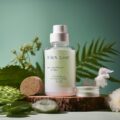Introduction: Understanding Skin Care Facts vs. Fiction
Our skin is our body’s largest organ, and caring for it properly is essential for both our health and self-confidence. However, the world of skincare is often clouded by myths and misconceptions that can lead us astray. In this article, we’ll explore some common skin care myths and uncover the truth behind them. By separating fact from fiction, we can make more informed decisions about our skincare routines and cultivate a healthier relationship with our skin.
Myth #1: You Don’t Need Sunscreen on Cloudy Days
One of the most persistent skincare myths is that sunscreen is only necessary on bright, sunny days. In reality, harmful UV rays can penetrate clouds and cause damage to your skin even when the sky is overcast. UVA rays, which contribute to premature aging and skin cancer, are present year-round and can even pass through windows.
To protect your skin, it’s important to apply a broad-spectrum sunscreen with at least SPF 30 every day, regardless of the weather. This simple habit can go a long way in preventing sun damage, reducing the risk of skin cancer, and maintaining a youthful appearance. Remember, consistent sun protection is an act of self-care and compassion for your future self.
Myth #2: Natural Ingredients Are Always Better for Your Skin
While many natural ingredients can be beneficial for the skin, it’s a myth that all natural products are inherently better or safer than synthetic ones. The truth is, both natural and synthetic ingredients can be effective and gentle on the skin when formulated properly.
Some natural ingredients, like essential oils, can actually be irritating for certain skin types. On the other hand, many synthetic ingredients have been extensively tested for safety and efficacy. The key is to choose products that work well for your individual skin type and concerns, regardless of whether they’re natural or synthetic.
Instead of focusing solely on “natural” labels, look for products with ingredients that have been proven to benefit the skin, such as hyaluronic acid for hydration, niacinamide for brightening, or retinoids for anti-aging. Remember, what matters most is how your skin responds to a product, not its marketing claims.
Myth #3: Oily Skin Doesn’t Need Moisturizer
Many people with oily skin believe that using a moisturizer will make their skin even oilier. However, this is a misconception that can actually lead to increased oil production. When the skin is deprived of moisture, it can overcompensate by producing more oil, leading to a vicious cycle.
The truth is, all skin types need hydration. For oily skin, the key is to choose a lightweight, non-comedogenic moisturizer that won’t clog pores. Look for ingredients like hyaluronic acid or glycerin, which can provide hydration without adding excess oil. By properly moisturizing oily skin, you can help balance oil production and achieve a healthier complexion.
Remember, caring for oily skin is not about stripping away all oils, but about finding the right balance. Treat your skin with kindness and understanding, and it will respond positively.
Myth #4: Anti-Aging Products Are Only for Older People
There’s a common belief that anti-aging skincare should only be started when visible signs of aging appear. In reality, taking preventative measures from an early age can be incredibly beneficial for long-term skin health.
Many so-called “anti-aging” ingredients, such as antioxidants and sunscreen, are actually protective measures that can benefit skin at any age. These ingredients help defend against environmental stressors that contribute to premature aging, such as UV rays and pollution.
Instead of thinking about “anti-aging” as turning back the clock, consider it as a way of nurturing and protecting your skin throughout your life. Start incorporating gentle, protective ingredients into your routine early on, and adjust as your skin’s needs change over time. Remember, the goal is not to fight against aging, but to support your skin’s health and vitality at every stage of life.
Myth #5: You Need to Wash Your Face Multiple Times a Day for Clear Skin
While it might seem logical that washing your face more often would lead to clearer skin, over-cleansing can actually do more harm than good. Washing your face too frequently can strip the skin of its natural oils, leading to dryness, irritation, and even increased oil production as your skin tries to compensate.
For most people, washing their face twice a day – once in the morning and once at night – is sufficient. Use a gentle, pH-balanced cleanser that doesn’t leave your skin feeling tight or dry. If you exercise or sweat heavily during the day, you can rinse with water or use a gentle cleanser afterwards.
Remember, the goal of cleansing is to remove dirt, oil, and makeup without compromising your skin’s natural barrier. Be gentle with your skin, and it will thank you with a clearer, healthier complexion.
FAQ: Common Questions About Skincare
Q1: Is it necessary to use toner in my skincare routine?
A1: Toner isn’t essential for everyone, but it can be beneficial for some skin types. Modern toners can help balance pH, provide hydration, or deliver active ingredients. If you enjoy using a toner and it works well for your skin, there’s no reason to stop.
Q2: How often should I exfoliate my skin?
A2: The frequency of exfoliation depends on your skin type and the type of exfoliant you’re using. Generally, 1-3 times a week is sufficient for most people. Over-exfoliating can damage your skin’s barrier, so it’s important to listen to your skin and adjust accordingly.
Q3: Can diet affect my skin?
A3: Yes, diet can have a significant impact on skin health. A balanced diet rich in fruits, vegetables, whole grains, and healthy fats can contribute to healthier skin. Some people may also find that certain foods trigger breakouts or other skin issues.
Q4: Is it okay to pop pimples?
A4: It’s generally best to avoid popping pimples, as this can lead to scarring and spread bacteria, potentially causing more breakouts. Instead, use spot treatments or consult a dermatologist for persistent acne.
Q5: Do I need different skincare products for day and night?
A5: While you don’t necessarily need completely different routines, some products are better suited for day or night use. For example, sunscreen is crucial during the day, while certain active ingredients like retinoids are often best used at night.
Conclusion: Embracing a Compassionate Approach to Skincare
As we’ve explored these common skincare myths, it’s clear that caring for our skin is not about adhering to rigid rules or chasing perfection. Instead, it’s about understanding our skin’s unique needs and responding with kindness and patience.
Remember, your skin is not just a canvas to be perfected, but a living organ that reflects your overall health and well-being. By approaching skincare with compassion and mindfulness, we can cultivate a healthier relationship with our skin and, by extension, ourselves.
As you navigate your skincare journey, be gentle with yourself. It’s okay to experiment and make mistakes – that’s how we learn what works best for us. Trust in your skin’s natural ability to heal and regenerate, and support it with informed, loving care.
In the end, the most radiant skin comes not from following trends or believing in myths, but from a place of self-acceptance and genuine self-care. Here’s to embracing your unique skin and treating it with the love and respect it deserves.









